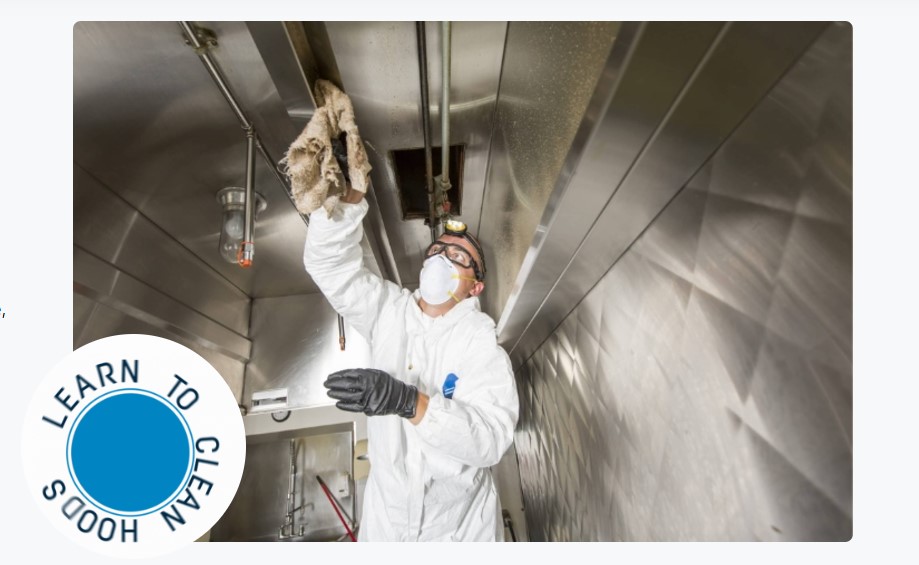Achieve Success with a Hood Cleaning Certification Program
Maintaining a clean kitchen is vital for any food establishment. A crucial part of this maintenance involves ensuring that the kitchen exhaust systems are free from grease and grime. A hood cleaning certification program is the best way to learn the necessary skills to keep these systems safe and efficient.
Why Hood Cleaning is Essential
Kitchen exhaust systems play a significant role in any commercial kitchen. These systems remove smoke, heat, and airborne grease from the cooking area. Over time, grease accumulates in exhaust hoods, ducts, and fans. This buildup poses a serious fire hazard. Grease fires are one of the leading causes of kitchen fires in restaurants and commercial kitchens. Therefore, routine cleaning is necessary to reduce these risks and ensure compliance with local fire safety codes.
Moreover, proper hood cleaning improves indoor air quality. Clean air contributes to a better working environment for kitchen staff. It also enhances the dining experience for customers. When air quality is compromised, it can lead to health issues for employees and diners alike.
The Importance of Certification
A hood cleaning certification program equips individuals with the skills needed to perform this essential work. Here are some key reasons to pursue certification:
1. Safety Compliance
Certification programs educate participants on safety regulations and standards. This includes compliance with NFPA (National Fire Protection Association) codes and OSHA (Occupational Safety and Health Administration) guidelines. Knowledge of these regulations is crucial for operating legally and safely.
2. Enhanced Skills
Completing a hood cleaning certification program provides in-depth training on the tools and techniques needed for effective cleaning. Participants learn how to use specialized equipment safely and efficiently. This hands-on training ensures that they can tackle real-world cleaning challenges.
3. Career Advancement
Having a certification increases employability. Many employers prefer or require certified individuals for positions in commercial kitchen maintenance. This certification opens doors to job opportunities, promotions, and increased earning potential.
4. Building Trust with Clients
For those starting their own cleaning business, certification builds trust with clients. It demonstrates professionalism and a commitment to safety and quality. Clients are more likely to hire certified cleaners, knowing they adhere to industry standards.
What to Expect from a Hood Cleaning Certification Program
Curriculum Overview
When enrolling in a hood cleaning certification program, students can expect a comprehensive curriculum. Key topics typically include:
- Understanding Exhaust Systems: This covers the various components of kitchen exhaust systems and how they function. Knowing how air flows through these systems is essential.
- Cleaning Techniques: Participants learn the most effective cleaning methods for removing grease and debris from different parts of the exhaust system. This training often includes hands-on practice with tools and chemicals.
- Safety Standards: Understanding safety protocols is a major part of the training. Students learn about hazardous materials, proper chemical handling, and personal protective equipment.
- Inspection Procedures: Participants are taught how to assess the condition of exhaust systems. This includes identifying areas that require more attention and understanding the maintenance required for optimal performance.
- Documentation: Keeping accurate records of cleaning services is crucial. Training covers how to properly document cleaning procedures and maintain compliance records.
Program Format and Duration
Most hood cleaning certification programs offer various formats to accommodate different schedules. Options may include:
- In-Person Classes: These provide hands-on experience with instructors present to guide participants.
- Online Courses: For those with busy schedules, many programs now offer online training. This allows flexibility to learn at your own pace.
- Hybrid Programs: A combination of online and in-person training is also common. This option offers the best of both worlds.
The duration of these programs can vary. Some may be completed in a few weeks, while others might take several months. It’s important to choose a program that fits your needs.
Steps to Get Certified
Achieving certification involves several steps. Here’s a clear outline of the process:
Step 1: Research Programs
Start by researching different certification programs. Look for schools with good reputations, experienced instructors, and comprehensive curricula. Check for accreditation, as this can indicate quality training.
Step 2: Enroll and Complete Training
Once you’ve selected a program, complete the required coursework. Actively participate in hands-on training sessions. Mastery of the material is crucial for success.
Step 3: Pass the Exam
After completing the training, you will need to pass a certification exam. This exam assesses your knowledge of safety practices, cleaning techniques, and compliance standards. Adequate preparation will help you succeed.
Step 4: Gain Practical Experience
If your program doesn’t include practical experience, seek opportunities to gain hands-on experience. This could involve internships or entry-level jobs in the field.
Step 5: Maintain Your Certification
Keep in mind that some certifications require renewal every few years. Staying updated with the latest practices and regulations is essential for maintaining your certification.
Career Opportunities After Certification
Upon completion of a hood cleaning certification program, many career paths become available:
1. Exhaust Cleaning Technician
As a certified technician, you can work for a cleaning company or in-house for a restaurant. Your skills will be essential in maintaining kitchen safety and efficiency.
2. Safety Inspector
With additional training, certified individuals can become safety inspectors. This role involves evaluating kitchen exhaust systems and ensuring compliance with safety regulations.
3. Business Owner
Many certified professionals choose to start their cleaning businesses. This allows for greater control over work schedules and client relationships. Starting your own business can be rewarding both personally and financially.
4. Trainer or Educator
Experienced technicians can transition into teaching roles within training programs. Sharing knowledge with aspiring professionals can be fulfilling and impactful.
Conclusion
Pursuing a hood cleaning certification program is a valuable investment in your career and safety. With proper training, you will gain the skills necessary to excel in this essential field. Clean kitchen exhaust systems are vital for preventing fires and maintaining air quality. Start your journey toward certification today and ensure a successful and safe future in kitchen maintenance.
Enroll in a hood cleaning certification program today to boost your career and ensure kitchen safety! Take the first step toward becoming a certified professional.













Post Comment